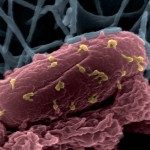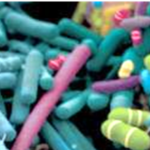Link to Pubmed [PMID] – 29913091
Gut Microbes 2019;10(1):92-99
Viruses that infect bacteria, or bacteriophages, are among the most abundant entities in the gut microbiome. However, their role and the mechanisms by which they infect bacteria in the intestinal tract remain poorly understood. We recently reported that intestinal bacteria are an evolutionary force, driving the expansion of the bacteriophage host range by boosting the genetic variability of these viruses. Here, we expand these observations by studying antagonistic bacteriophage-bacteria coevolution dynamics and revealing that bacterial genetic variability is also increased under the pressure of bacteriophage predation. We propose a model showing how the expansion of bacteriophage-bacteria infection networks is relative to the opportunities for coevolution encountered in the intestinal tract. Our data suggest that predator-prey dynamics are perpetuated and differentiated in parallel, to generate and maintain intestinal microbial diversity and equilibrium.



